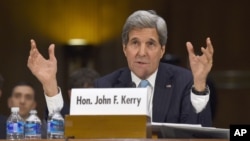U.S. lawmakers have taken the first step toward giving formal permission for the ongoing campaign against Islamic State fighters in Iraq and Syria. A Senate panel approved an authorization for the use of military force, or AUMF - a document that has virtually no chance of being adopted by the current Congress, but could inform deliberations next year.
Months into a U.S.-led air campaign against Sunni extremists, the Senate Foreign Relations Committee approved a three-year AUMF that stipulates there should be no American ground combat operations. All Democrats voted in favor; all Republicans against.
The committee’s chairman and author of the measure, Senator Robert Menendez, explained his rationale for the time constraint.
“I do not believe the AUMF should be unlimited," he said. "A three-year time frame would allow this president, and a new president, time to assess the situation and make responsible decisions together with Congress about how and whether to continue military action."
The vote came two days after Secretary of State John Kerry said the Obama administration wants an AUMF, but one that does not rule out ground action in the case of unforeseen circumstances. That, combined with the fact that Congress is expected to adjourn in the coming days, led the committee’s top Republican, Bob Corker, to conclude that the current AUMF is pure symbolism.
“We know this is going nowhere because we [lawmakers] are going to be out of here in two days; but, even if we had time, we know the administration would not support what is before us today," said Corker.
Other Republicans expressed dissatisfaction with the administration’s explanation of its strategy to defeat the Islamic State, particularly in Syria. Senator Marco Rubio said the Menendez draft is a recipe for failure.
“Unless we can beat them [IS] with only airstrikes in three years where they are currently located, then ISIL gets to stay? That sounds to me like an unacceptable position for us to take," he said. "his effort to micro-manage the tactical pursuit of the objectives we have laid out is a grave error." .
Democratic Senator Dick Durbin was quick to respond.
“It is a limitation on the power of the president. It is a limitation on the commander-in-chief," he said. "It is written in the Constitution we have all sworn to uphold and defend. By our nature, we limit this commander-in-chief."
Another Democrat, Senator Chris Murphy, said keeping U.S. ground forces out of combat is critical because, in his view, the presence of such forces helps recruit more terrorists than are killed in battle.
Chairman Menendez concurred.
“I do envision boots on the ground, but they are not American boots. They are Iraqi boots, Kurdish boots, moderate Syrian forces’ boots," he said.
Barring unforeseen developments, it will be up to the next Congress to wrestle with the specifics of an AUMF.
Beginning in January, both houses will be controlled by Republicans, many of whom advocate a more muscular U.S. response to Islamic State than the Obama administration has mounted so far. By contrast, many Democratic lawmakers want a more constrained and limited U.S. engagement than the administration is comfortable endorsing.




